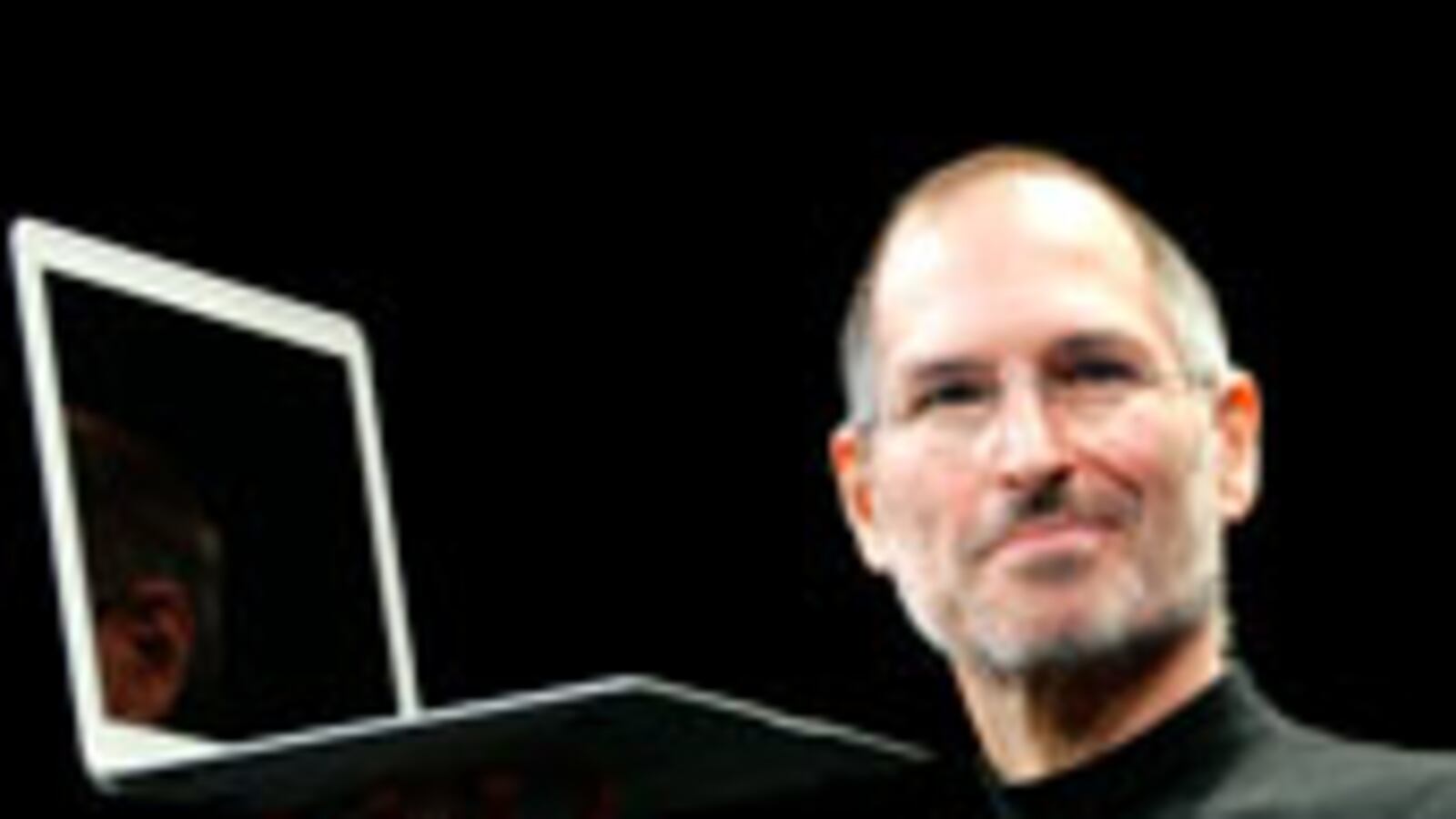
San Francisco’s Moscone Center, site of a huge Apple developers' convention which kicks off today, is abuzz today with the rumors—fed off a report in The Wall Street Journal Friday that it’s likely that Apple Chief Executive Officer Steve Jobs would return from his medical leave this month—that the 54-year-old founder and legend will make a surprise appearance.
Apple seems like the closest thing that the real world has given us to a controlled scientific experiment of the Great Man Theory: We’ve seen what’s happened to Apple with him and without him.
A survivor of pancreatic cancer, Jobs looked skeletal and sickly in public last autumn, but his shadow over the wildly profitable Apple remains large: He’s still Silicon Valley’s equivalent of a rock star, at least for techno-biz insiders and for his own baby boomer generation, which still runs what’s left of the mainstream media. But all the buzz about Jobs’ rumored return has also raised an uncomfortable question: Does Apple need Steve Jobs anymore? Has the CEO generally recognized over the past few years as the most indispensable in American business proven, by his absence, that he’s as replaceable as a seven-year-old iBook?
The numbers make a case for it. Apple’s stock has doubled from the price it hit soon after Jobs announced in January that he was taking a five-month medical leave. The executive who has helmed Apple in Jobs’ absence, Timothy Cook, is widely admired for his ability to handle large, complex challenges with brutal efficiency. Indeed, Cook has been running Apple’s day-to-day operations for a long time now. He has been crucial to its success, as has Jonathan Ive, Apple’s acclaimed design guru. Couldn’t either of them be CEO?
Part of the issue is the complete mystery surrounding Jobs’ well-being. For a man in a highly public role, responsible to his company’s shareholders, Jobs has been inexcusably elusive about his health: Although he claimed he was taking medical leave because of a “hormone imbalance,” which didn’t sound all that bad, it has since been reported that Jobs had been “starving to death” from a frightening inability to digest protein. It’s hard to know what to believe given that Jobs has such a long history of being shrewdly manipulative, misleading, or even outright deceitful to the media—and usually getting away with it. On April 28, his lawyer said that Jobs wouldn’t have the stamina to attend a long public hearing (starting at 7:30 p.m. and probably going past midnight) about his plan to tear down his 14-bedroom, 17,000-square-foot Spanish colonial mansion in Woodside, California. If that’s true, does he have the stamina to continue fiercely micro-managing Apple every day—from personally fussing over the right fonts for its Web pages to obsessing over precisely the right kind of metallic casing for its notebook computers? Or did Jobs instruct his lawyer to fib for him because he didn’t want to subject himself to hostile questioning from the historic preservation crowd that had long opposed the demolition?
If Jobs stepped down now, he would be leaving Apple in terrific shape: Apple’s stock recently closed at $144 a share, giving the company a market valuation of $129 billion, not far behind Google’s and about three-quarters as much as mighty Microsoft’s. Apple’s profit was nearly $5 billion last year, even higher than Google’s. It has been so profitable that it’s now sitting on a motherlode of $25 billion in cash and short-term investments, as much as Microsoft and more than Google. Since he returned from a 12-year exile in 1997, Jobs has transformed Apple from an also-ran in personal computers, a field in which it’s tough to make real money, into a leader in the mobile Internet, a field that has tremendous potential for growth. Jobs has restored Apple’s image and its culture—but now his child has apparently grown up enough to get along without him.
It’s heretical to Apple’s loyalists even to ask aloud whether Jobs could be replaced: In our times, no company has operated on a cult of personality more than Steve Jobs’ Apple. Jobs’ charisma and genius are commonly cited as the reasons for the company’s enviable success. And Apple seems like the closest thing that the real world has given us to a controlled scientific experiment of the Great Man Theory: We’ve seen what’s happened to Apple with him and without him (during his dozen years away, 1985-1997, after he had been pushed out of the company he co-founded). As I wrote in my book The Second Coming of Steve Jobs: “During Steve’s long exile, Apple lost almost all of the qualities that had made it an astonishing success during his heyday there.” Apple’s software, which had stood out as innovative, original, and uncommonly easy to use, hadn’t improved much during Jobs’ long absence, which gave Microsoft time to imitate it. And Apple’s brand image of creativity and nonconformity was “deteriorating badly.” Apple lost $1 billion in 1996 and $708 million in the first three months of 1997, and was in a vicious death spiral. The stock price was less than $4 a share (adjusting for subsequent splits) before the board of directors ousted the CEO and Steve Jobs seized power in the summer of 1997.
Jobs’ great talents aren’t quite as necessary or valuable as they once were. Jobs has always been masterful at manipulating the mainstream media for publicity purposes, getting himself on the covers of major national magazines whenever he has a new product to promote, playing the top titles against each other in competition for his exclusives. He could be infectiously enthusiastic and extraordinarily charming: whenever we talked, his eye contact bordered on hypnotic. He also enforced a fierce loyalty: He would excommunicate insiders who revealed unflattering information, and reward reporters who had proven that they could be counted on. Because Jobs was one of the few CEOs whose photo on the cover could sell business magazines on the newsstand, he had media power.
But that doesn’t work with new media, which constantly infuriates him with its penchant for leaking details of Apple’s new creations. While he was able to control the old media brilliantly, the new media won’t be controlled.
His media aura once paid dividends past the good press. Before Jobs came on the scene in the late ‘70s, business was seen as boring and conformist, not creative, revolutionary, even cool. When a dashing Steve Jobs appeared on magazine covers in his 20s, he was a pop-culture hero to teenagers like myself tooling away on their Apple IIs. But I don’t think that teenagers and twentysomethings today look up to Jobs the way that we did. They love their iPhones and iPods but do they even know who Steve Jobs is or why he’s so important—and if they did, wouldn’t he just seem like some old bald dude who’s weirdly skinny and trying too hard to look cool in his black shirt and faded bluejeans?
During Jobs’ illness, reporters have often asked me, as one of his biographers, who could replace this charisma and vision. My answer: someone with persistence, resilience, and tenacity.
A more interesting question for me: How do you replace his obsessive focus and his propensity for extraordinary risk-taking and his persistence, tenacity, and resilience. Every great business leader needs to be ruthlessly focused on what’s most important for the company. For Apple it has been about design and originality above all else. True originality—“Think Different”—means that Apple’s CEO must take really big risks, and Jobs has done it again and again: When Jobs returned to Apple in the late ‘90s, all the research in the PC business said that consumers wouldn’t buy “all-in-one” designs that put the computer and the monitor in the same case. Jobs ignored that, bet big entirely on his own instinct with the sleek iMac, a huge hit that helped to revive the foundering company. When Apple was creating iTunes and the iPod, everyone seemed to be downloading music for free, but Jobs bet that they would pay for songs if the prices were low, the experience was easy, and the gadgetry was cool. He was right. And he came out with the iPhone with just a touch screen rather than a physical keypad, another big bet that has paid off terrifically.
No one, not even Jobs, is right all the time when they take real risks. As I point out in Walk the Walk, my upcoming book about leadership, Jobs has hatched as many flops as hits over the past four decades. The Apple I was a small seller, but the Apple II was a sensation. The Lisa computer bombed, but the Macintosh became an enduring success. During his long exile from Apple, Jobs nearly lost his entire personal fortune betting tens of millions of dollars on two startup companies that struggled for a decade: NeXT Computer, a high-profile failure, and Pixar, which ultimately made him a billionaire and revolutionized the field of motion-picture animation. During his second tenure at Apple, Jobs had some conspicuous nonstarters (does anyone remember the Mac Cube or Apple TV?) along with his blockbusters (the iMac, iPod, iTunes, and iPhone).
During Jobs’ illness, reporters have often asked me, as one of his biographers, who could replace this charisma and vision. My answer: someone with persistence, resilience, and tenacity. Nominee one, Timothy Cook, Apple’s 48-year-old chief operating officer and the subject of much speculation. He’s relentlessly hard-driving with tremendous stamina and a mastery of the tough and unglamorous behind-the-scenes issues that have been vital to Apple’s success, such as inventory management.
My preferred choice, however: Jonathan Ive, which would signal the company’s continuation of its extraordinary commitment to design as the source of its identity and its competitive edge. It might help that Ive, like a younger, healthier Jobs, personifies coolness and creativity. And it’s not encouraging to recall what happened the last times that Apple’s CEOs were operations executives—witness Jobs’s predecessors, Mike Spindler and Gil Amelio. Cook has proven far superior to them—he’s scarily good, actually, with an appreciation for style—but I think there’s something about Apple’s culture that cries out for a bona fide design nut at the very top.
So yes, while I wish the best for his health, Steve Jobs can be replaced. And while I don’t own Apple stock because I write and comment about the company, if I did, I would hold on to it with Cook or Ive as CEO and the other still committed to the team. A company can thrive without him because of the culture he has entrenched and the other leaders who have learned from his model—that would prove the ultimate achievement of Jobs’ historic tenure.
Alan Deutschman is a Daily Beast columnist. His next book, Walk the Walk: The #1 Rule for Real Leaders, will be published in September by Portfolio. He is also the author of Change or Die, A Tale of Two Valleys, and the Second Coming of Steve Jobs. He has been a Silicon Valley correspondent for Fortune, the “Profit Motive” columnist for GQ, a senior writer at Fast Company, and a contributing editor at Vanity Fair and New York Magazine.






